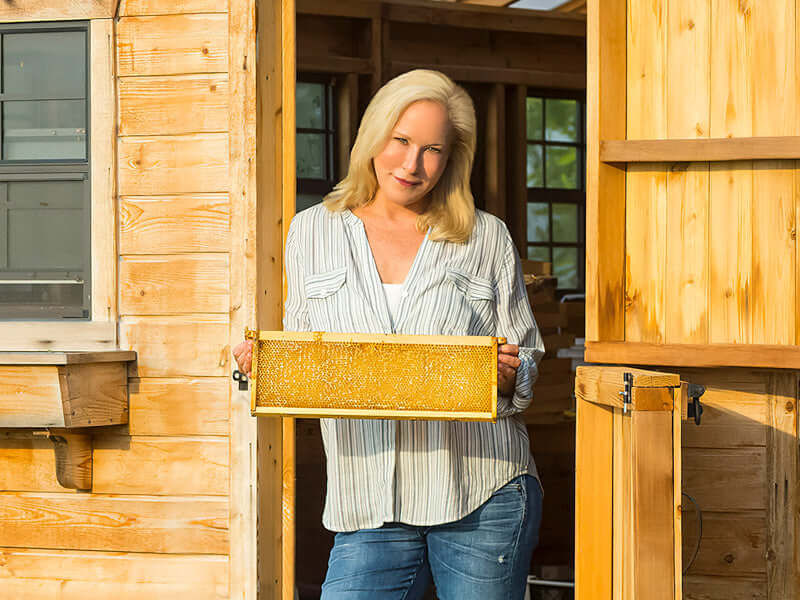Americans consumed 596 million pounds of honey in 2017, according to a recent study by the University of California Agricultural Issues Center. Each means that each person ate 1.82 pounds of honey during the time of the survey. Not surprising since honey is one of the most nutritious foods in the market for centuries. Unlike commercial honey, which undergoes pasteurization and filtration processes that remove many nutrients and enzymes, raw honey retains these beneficial components. One of the latest researches claimed that honey has a lot of benefits for people aged 65 and above. Additionally, consuming local honey and bee pollen can help manage seasonal allergies and improve immunity. Aside from its medicinal benefits on a person’s body, honey offers numerous health benefits, making it essential for seniors to include it in their diet regularly.

The Allergy Support Honey Set is the perfect way to soothe your allergy symptoms. It includes our Spring Honey, Alfalfa Honey, and Wildflower Honey.
Eating Raw Honey Improves Gastrointestinal Health
As mentioned earlier, raw and commercial honey are not the same. Raw honey and organic honey is known for its antibacterial properties and treating diseases like Methicillin-resistant Staphylococcus aureus (MRSA) as well as other antibiotic-resistant infections when converted in purified forms. Its anti-inflammatory properties, along with the antibacterial effects of hydrogen peroxide released through an enzymatic process, also contribute to gastrointestinal health by soothing the digestive system. Also, a dose of honey may be a good source of probiotics that could improve an elderly’s natural gut flora. All seniors diagnosed with stomach ulcers or other gastrointestinal problems find ingesting honey beneficial. If all nursing homes serve honey to their patients, stomach problems may improve.
Manuka Honey Lowers Blood Pressure And Improves Cholesterol
The antioxidant compounds found in honey have helped in reducing a person’s blood pressure. Antioxidants in honey help reduce oxidative stress, which in turn helps lower blood pressure and improve cholesterol levels. A study on both humans and rats showed noticeable improvements in their blood pressure levels after consuming honey regularly. Honey consumption leads to significant improvements to a person’s high LDL cholesterol levels. Since most seniors are affected by blood pressure and cholesterol problems, eating honey reduces their risks of acquiring more severe ailments in the long run.

Honey Sticks are perfect for on-the-go snacking and busy individuals!
Bee Pollen Boosts Memory And Energy Levels
Research by New Zealand’s University of Waikato discovered that rats who were given honey have better memory as they age compared to those who did not consume honey in their diet. Honey contains amino acids which are essential for brain health, memory function, and energy production. Honey's anti-inflammatory properties can also help soothe a cough or sore throat. This can be applied to humans since honey consumption can help in addressing memory impairment. Seniors are also encouraged to take a teaspoon of honey before walking a few blocks in the neighborhood or when doing several physical activities inside the nursing home to boost their energy levels. This practice was inspired by the Olympian tradition where athletes eat figs drizzled with honey to stimulate more energy from the natural sugars.
Eating Raw Honey Has Benefits Inside and Out
Honey contains a lot of minerals and nutrients that can improve overall well-being when consumed in moderation. It is clear that honey has many remarkable benefits for the elderly. From soothing allergies to treating coughs, boosting the immune system, and aiding in wound treatment, honey truly is a versatile superfood that deserves a place in every senior's diet. Its natural sweetness combined with its nutrient-rich profile make it a great alternative to processed sugars and artificial sweeteners. And with numerous studies backing its antioxidant properties and role in promoting overall health, there's no reason why the elderly shouldn't be incorporating raw honey into their daily routine.

Raw Honeycomb, known as old-fashioned chewing gum, is a fun way to get your daily dose of honey
But beyond just the physical health benefits, consuming raw honey also has positive effects on mental well-being. As we age, it can become easy to feel isolated and disconnected from society. But sitting down for a cup of tea with a friend or loved one and indulging in some raw honey can go a long way in fostering social connections and improving overall happiness.
So if you're an elderly individual reading this blog post, I urge you to consider adding raw honey to your diet for a healthier and more fulfilling life. And for those caring for an older adult, don't hesitate to introduce them to the wonders of this natural elixir.
In today's fast-paced world where processed foods dominate our diets and artificial ingredients are hidden in so many products, it's refreshing to know that there are still natural remedies like honey that can provide both physical and emotional benefits. Also, raw honey isn't just for the elderly-only age group - is is beneficial for everyone! So let's all raise our spoons to better health and encourage our elder loved ones to do the same by incorporating raw honey into their daily lives. Trust me, they won't be disappointed.












